A Higher Loyalty by Comey James

Author:Comey, James
Language: eng
Format: epub
Publisher: Pan Macmillan
Published: 2018-04-17T04:00:00+00:00
CHAPTER 10
ROADKILL
Standing in the middle of the road is very dangerous; you get knocked down by the traffic from both sides.
—MARGARET THATCHER
I HAVE NEVER MET Hillary Clinton, although I tried. When I became the United States Attorney for the Southern District of New York in January 2002, I asked my assistant to arrange an introduction to the state’s junior senator. I thought it was a standard thing for the United States Attorney—there were four of us representing the federal government in New York State—to know the senators in the state, and I didn’t want to be rude. I had met the other senator, Chuck Schumer, during the Senate confirmation process, but for some reason I had not met Clinton. After a number of attempts and multiple messages with Clinton’s office, we gave up. It wasn’t a big deal at the time, but I found it odd.
To this day, I don’t know why the meeting never happened. I suppose it could be the result of poor administrative support at Clinton’s office, or she was simply too busy. I suppose it also could have been due to the fact that seven years earlier, I had worked for five months for the Senate committee investigating the Clintons for a variety of things grouped under the heading “Whitewater.” I was a junior lawyer for the committee, still working at a Richmond law firm and charging the Senate by the hour. My focus was largely on the suicide of the former deputy White House counsel, Vincent Foster, and the handling of documents in his office. But my role on the Whitewater committee was so minor and so short—I left the assignment when our son Collin died in August 1995—that it seemed unlikely that was the reason the senator wasn’t returning my calls.
The unreturned messages in early 2002 were more likely due to the fact that my office was then supervising an investigation into Senator Clinton’s husband’s pardon of fugitive oil trader Marc Rich a year earlier, in the final hours of the Clinton presidency. In 1983, Rich and his codefendant, Pincus Green, had been indicted on sixty-five criminal counts by then–United States Attorney Rudy Giuliani. Among the counts were income tax evasion, wire fraud, racketeering, and trading with an enemy of the United States—Iran—while it held dozens of Americans hostage. Rich fled the United States shortly before the indictment (then the biggest tax evasion case in U.S. history). He was given safe haven in Switzerland, which refused to extradite him for what the Swiss considered essentially tax crimes.
Nearly two decades later, on his final day in office, President Clinton had issued Rich a highly unusual pardon. It was unusual because the pardon was given to a fugitive, which was, to my knowledge, unprecedented. It was also unusual, and suspicious, because it had not gone through the normal review process at the Department of Justice. The pardon had only been seen by then–Deputy Attorney General Eric Holder, who, without seeking input from the prosecutors or agents who knew the case, cryptically told the White House he was “neutral, leaning positive.
Download
This site does not store any files on its server. We only index and link to content provided by other sites. Please contact the content providers to delete copyright contents if any and email us, we'll remove relevant links or contents immediately.
| Africa | Americas |
| Arctic & Antarctica | Asia |
| Australia & Oceania | Europe |
| Middle East | Russia |
| United States | World |
| Ancient Civilizations | Military |
| Historical Study & Educational Resources |
Cat's cradle by Kurt Vonnegut(13867)
Pimp by Iceberg Slim(12931)
Underground: A Human History of the Worlds Beneath Our Feet by Will Hunt(11257)
4 3 2 1: A Novel by Paul Auster(11049)
The Radium Girls by Kate Moore(10907)
American History Stories, Volume III (Yesterday's Classics) by Pratt Mara L(4825)
Perfect Rhythm by Jae(4621)
Wiseguy by Nicholas Pileggi(4586)
The Fire Next Time by James Baldwin(4343)
Paper Towns by Green John(4169)
A Higher Loyalty: Truth, Lies, and Leadership by James Comey(4033)
Pale Blue Dot by Carl Sagan(4001)
The Mayflower and the Pilgrims' New World by Nathaniel Philbrick(3914)
The Doomsday Machine by Daniel Ellsberg(3731)
Too Much and Not the Mood by Durga Chew-Bose(3694)
Killers of the Flower Moon: The Osage Murders and the Birth of the FBI by David Grann(3609)
The Borden Murders by Sarah Miller(3590)
The Sympathizer by Viet Thanh Nguyen(3479)
Killing England by Bill O'Reilly(3455)
